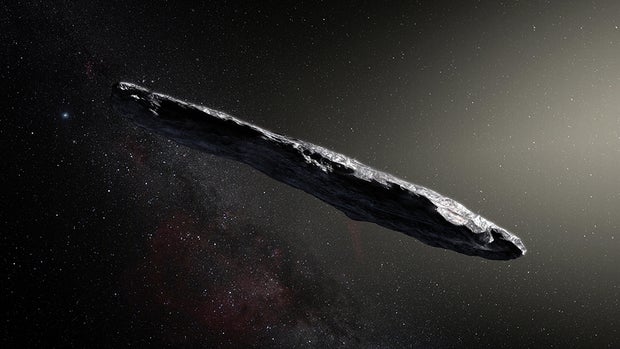When you think of the stereotype of someone who believes in aliens, you just might picture a paranoid person in a tin foil hat. Well, one the most famous “believers” in the world is a dapper, and incredibly talented, 62-year-old scientist who lives in a lovely home just outside of Boston.
Avi Loeb said, at his core, he is just a “curious farm boy” who was raised in Israel where he cared little about talk of flying saucers.
“I hate science fiction,” Loeb said recently during a long talk about his views on extraterrestrial beings. “Because many times the storyline violates the laws of physics. And I can’t enjoy it because it sounds unreal to me.”
Loeb was so gifted in physics growing up, he was put in a special program while serving in the Israeli military. In the four decades since, his accomplishments have been out of this world.
Here’s a portion of his resume: PhD in physics at age 24, longtime Harvard University professor, the longest serving chair of Harvard’s Department of Astronomy, author of nine books, a New York Times bestseller, author of more than 1,000 scientific papers and a former member of the President’s Council of Science and Technology.
“There is no bigger question in science than ‘Are we alone?” Loeb said.
“Are we alone?” he was asked.
“Probably not,” Loeb said.
Loeb is not alone on that. Sixty-five percent of Americans think life exists on other planets according to Pew Research.
Theories on Oumuamua, 3I/Atlas
What makes him an outlier began in 2017 with an object called Oumuamua. It was the first confirmed object from another solar system to visit our solar system and it was unlike anything NASA had seen.
It was oddly shaped; ten times longer than it was wide. There was no water and no ice. There was no comet-like tail, and it actually sped up as it moved away from the sun.
Loeb declared Oumuamua could be a spacecraft.
“Would I be happier if it’s a rock? Simply because it’s not a threat? Or would I be happier if it’s alien technology? I have a hard time deciding, but as a scientist I want to figure it out,” Loeb said.
This summer Loeb was back in the headlines after the discovery of another interstellar object: 3I/Atlas.
It is unusually bright, has an odd trajectory and it is massive. Loeb again wondered aloud if it is a piece of “extraterrestrial technology.”
“The brightness that we see coming from it, if it’s just a reflection of sunlight from a solid surface implies that it has a size bigger than Manhattan island. That’s one million times more massive if it’s a rock than the previous objects we saw,” Loeb said.
But other scientists say it’s just a comet without a tail. They call it a “dark comet.”
“That it’s an oxymoron,” Loeb said. “It’s like looking at an elephant and saying that’s a zebra without stripes. When you say it’s a comet without a tail. The tail is the signature of the comet.”
“It’s about the process”
Loeb’s headline grabbing theories have excited deep pocketed donors for his projects at the Department of Astronomy at Harvard. But while Loeb has his benefactors, he also has his detractors who aren’t buying what he is selling.
“I don’t really care what people think,” Loeb said. “Science is not about us lecturing the public what’s right and wrong. It’s about the process by which we all learn together.”
Loeb now heads The Galileo Project building observatories across the country to watch for interstellar activity because he thinks “discovering alien technology” could be the biggest leap for mankind.
“They may be far more accomplished than we are, they might have bigger brains, they may have artificial intelligence that goes well beyond what we have,” Loeb said. “They may know more about science. Let’s just observe and listen.”
And if he’s wrong?
“I don’t care if I’m wrong,” Loeb said. “This isn’t about me.”
Source link

